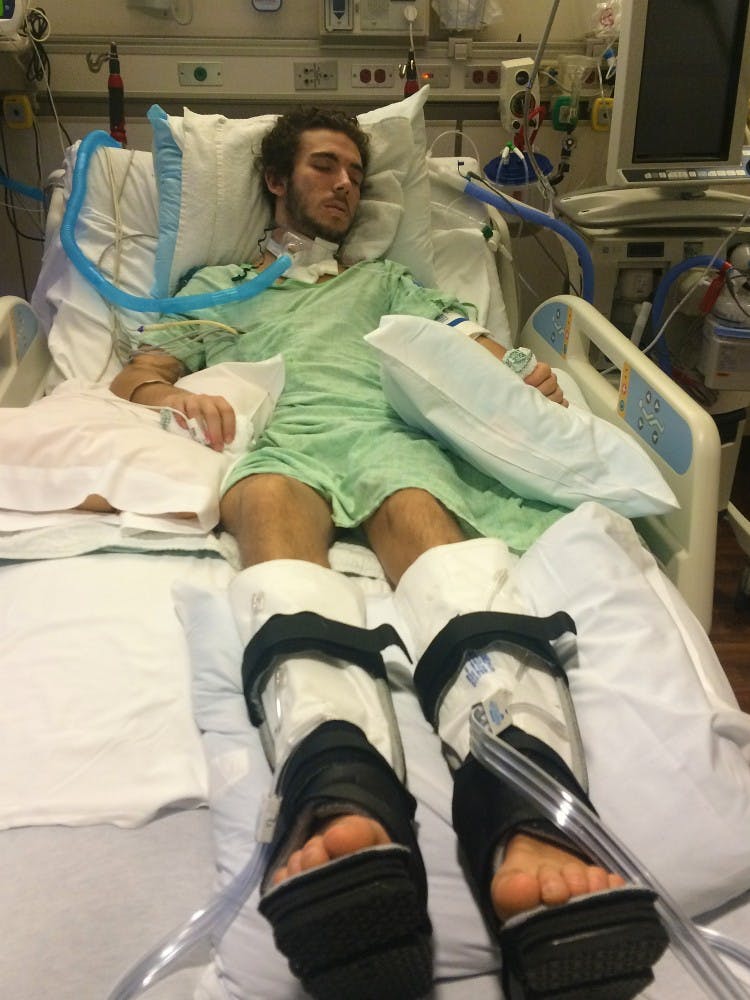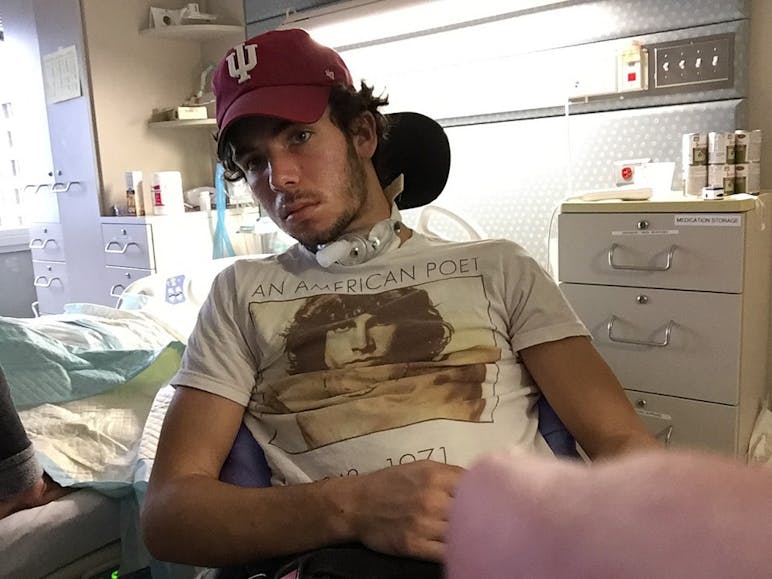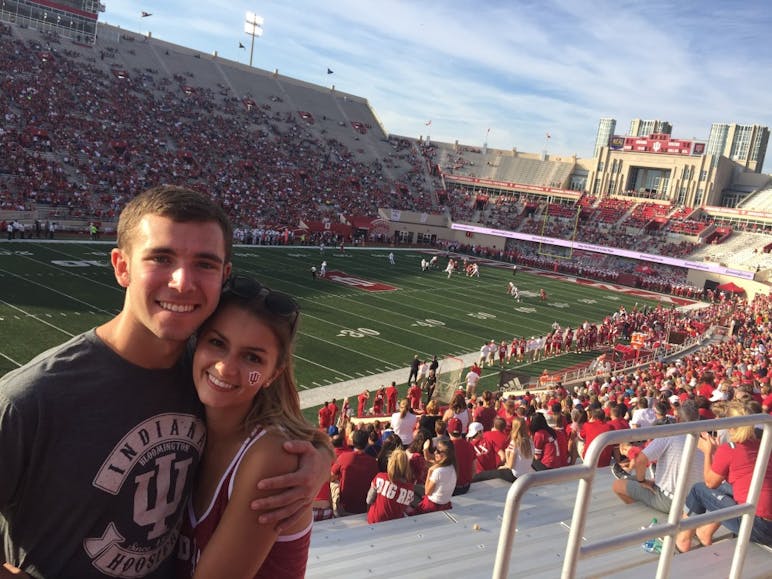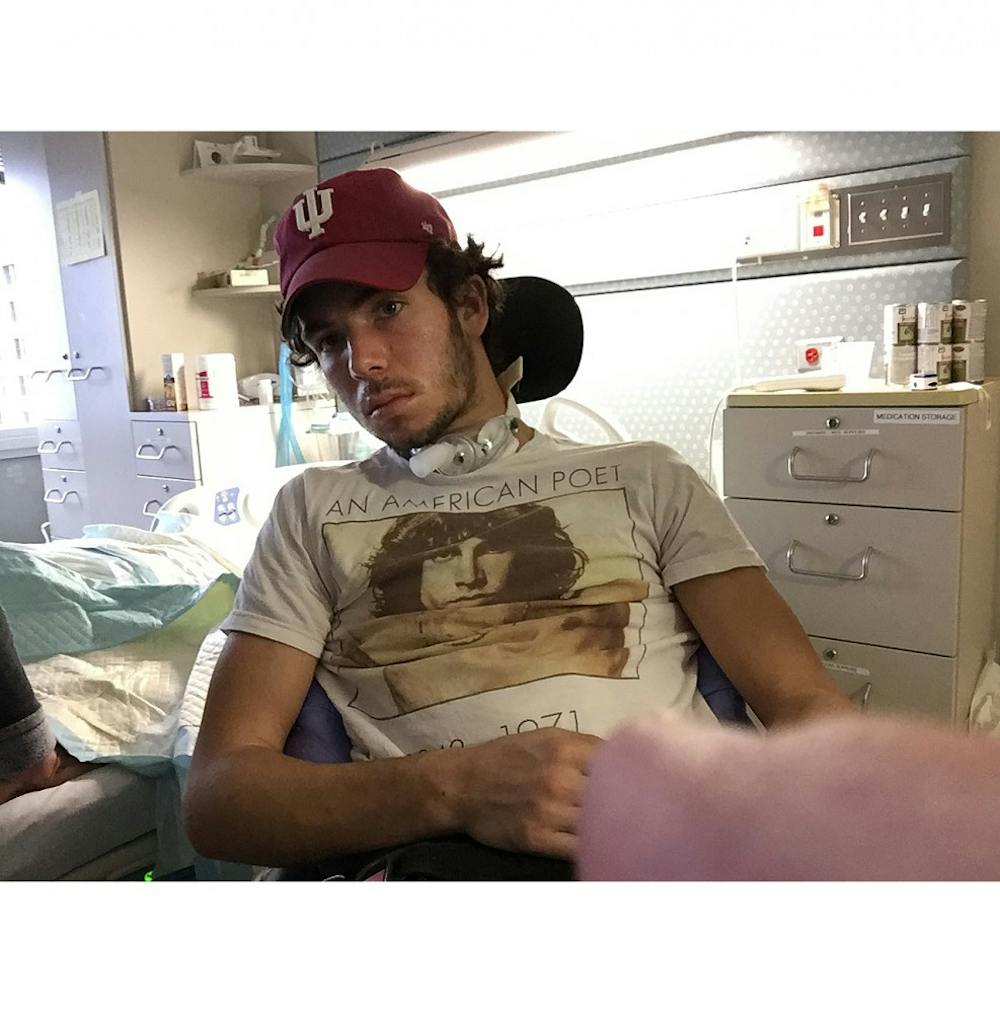Brett Becker was moving too fast.
The 19-year-old experienced skier came to a stop halfway down the ski hill, a sure sign of too much speed. After regaining his composure, Brett continued down the hill, picking up speed and soaring off a jump.
His dad, Bryan, knew as soon as Brett took off that something was wrong. His son flailed in the air and overshot the landing by ten feet. Bryan ripped off his skis and started running up the hill.
By the time Bryan got to his son, Brett was lying unconscious in the snow. His face was blue and his heart stopped.
Bryan started CPR. Ski Patrol showed up a few minutes later.
* * *
When Brett’s mother, Peggy, got the call Jan. 4, 2016, that her son’s ski trip with his dad, uncle and two cousins went awry, she was taking down Christmas decorations at their home in Libertyville, Illinois.
She was told her son was alive in the hospital in Wausau, Wisconsin, but in a coma. Brett had hit his head during the fall, resulting in a brain injury. He wasn't breathing, but one of the ski patrol volunteers, a respiratory therapist, had saved his life by putting a tube down Brett’s throat to help him.
Hooked up to beeping monitors and fighting for his life, Brett hardly resembled the boy he was before.
In high school, he wrestled and played lacrosse and football. His first semester at IU, finished just a month before the accident, Brett took 18 credit hours and earned a 4.0 GPA.
When Peggy arrived at the hospital, Brett was still in a coma. The doctors told Peggy and Bryan that their son had a diffuse axonal injury. It’s similar to shaken baby syndrome and basically means his brain had been jostled around his skull.
Brett’s sister Megan was preparing for recruitment for Alpha Chi Omega, her sorority at Butler University, when she heard Brett was hurt. She was on the road in 15 minutes.
At home, Megan met up with her twin, Haley, and the two flew up to Wausau on a private plane. Megan only packed a pair of jeans and a sweatshirt for the trip and Haley packed jawbreakers and an adult coloring book.
Brett’s girlfriend, Maddie Anderson, and two best friends, Mac Copeland and John Quigley, also drove up to Wausau.

It would be more than three months until Peggy and her family returned home.
* * *
After a week, Brett was transferred to Northwestern Memorial Hospital in Chicago.
Dr, David Ripley, who focuses on brain injury medicine and rehabilitation from the Shirley Ryan AbilityLab – formerly the Rehabilitation Institute of Chicago – visited Brett there. He chose Brett be part of the AMiCouS program, one of the only programs in the United States that works to actively treat patients in minimally conscious or vegetative states.
On Feb. 4, 2016, exactly one month after the accident, Brett woke up from his coma and entered into a minimally conscious state.
During this time, Peggy said Brett’s movements were involuntary. If someone spoke, he would look in their direction. But he couldn’t hold his own head up.
Brett was still silent. They knew he had damaged the language part of his brain, and as time went on, they became more sure that he had aphasia, a language disorder that makes communication difficult.
But because Brett was left-handed, they were optimistic. Left-handed people use both sides of their brain more than right-handed people, so they usually suffer from less severe versions of aphasia, Peggy said the doctors told her.

One day, when they visited Brett in February, Copeland and Anderson were sitting in his room while Peggy and Bryan went out to eat.
Anderson knew Brett wanted to speak. Whenever she talked to him, he’d purse his lips and lean his head toward her. But Anderson knew she had to be patient. She had to let him speak when he was ready.
Anderson leaned over her boyfriend and whispered “Brett, say hi.”
Brett opened his mouth, as if trying to speak. But nothing came out.
Anderson kept whispering.
“Hi, Brett.”
“Hi, Brett.”
“Hi, Brett,” Brett eventually breathed out.
It was the first time he’d spoken in over a month.
Eventually, Brett dove into music therapy, relearning to speak singing “Roadhouse Blues” by the Doors.
* * *
Exactly two months after the accident, Brett came out of his minimally conscious state and entered post-traumatic amnesia.
He had no memory of what happened, who he was or where he was. Brett didn’t know how to read, write or eat. He didn't know what a number was.
The doctors had to put a mesh barrier around Brett’s bed because if he woke up in the middle of the night, he would forget he didn’t know how to walk.
“I can’t believe we had to put our kid in a cage,” Peggy said.
Shirley Ryan AbilityLab used a therapy dog named Georgia to work on Brett’s memory. The therapists would tell him facts about the dog, such as that she was from Alabama and was trained in a prison.
An hour later, they’d ask him to recite those facts. He could never remember until a few months later when, out of the blue, Brett asked his mom about the therapy dog, Georgia, from Alabama who was trained in a prison.
* * *
A couple weeks after he woke up from his state of minimal consciousness, Brett went home to Libertyville. Friends had taken the Christmas decorations down, but there were still dishes in the sink and Brett’s folded laundry in the laundry room.
“Everything was the same,” Peggy said. “But my world was different.”
The Beckers put an intercom system in their house and kept walkie talkies with them. Brett couldn't be left home alone and had to call if he needed anything, even to go to the bathroom in the middle of the night.
“But I was the happiest clam alive,” he said.
Brett’s memories began coming back to him in dreams. He would wake up in the middle of the night and call his parents on the intercom, asking them if something was just a dream or a memory. Usually, it was a memory.
Brett had two goals at this point in his recovery: to run and to go back to IU.

Brett began rehabilitation six hours a day, five days a week at the Shirley Ryan AbilityLab’s Wheeling DayRehab Center.
Every day, his physical therapist Kyle Koselke put Brett through exercises to work on his strength, balance and symmetry of walking.
Even when he was in pain, Koselke said Brett would often go up and congratulate other patients on their rehabilitation achievements.
“He was the most smiley patient I’ve ever worked with,” Koselke said.
In August 2016, Brett ran for the first time in eight months.
Along with therapy, Brett began taking a few classes at the College of Lake County, a local community college, in fall 2016 in hope of returning to IU when he was ready.
Slowly but surely, he gained independence.
* * *
Now 22, Brett has been back at IU for three semesters. He has changed his major to recreational therapy, and will graduate only slightly late because of AP credits and his community college classes.
Brett’s life is very structured. When he relearned how to take care of himself and cook, among other things, the therapists would number the steps of each process. He still follows these steps religiously.
Brett lives off-campus, and while he sometimes takes the bus, he prefers to walk to class.
He gets to the Student Recreational Sports Center early each morning and works out, focusing on cardio.
Although he relearned to run, Brett's gait is still awkward from the accident, so he can’t use the treadmill. Instead, he runs outside or uses the elliptical, stair stepper or stationary bike.
“Working out lets my brain take a break,” Brett said.
After the gym, Brett makes his protein shake and takes a nap before class. He is taking nine credit hours this semester and is moving to 12 in the spring.

Since the accident, Brett’s social life has changed.
Over the past few months, Brett and Anderson’s relationship has gradually become more like best friends than a couple.
Last month, they broke up.
Brett’s brain injury also won’t let him have a typical “college” experience because he can’t drink and party like his peers.
A couple weeks ago, his family came to visit and they went to the Bluebird. While his family drank, Brett had a Coke.
“My alcohol now is caffeine,” Brett said.
That’s part of the reason Brett loves spending his afternoons in the coffee shop at Goodbody Eatery dining hall. Since the accident, he gets tired easier and relies on iced coffee to get him through the day.
When Brett walks in the shop, the baristas call out his name.
“I’m friends with everyone,” he said.
Three years ago, Brett’s whole life changed in a matter of seconds. He went from a pre-med student to having a less than 10 percent chance of living. His recovery inspired him to change his major to recreational therapy, the field that helped give him back his life.
Brett will finish classes at IU next May, and will hopefully get an internship. After that internship, he’ll be able to graduate.
The third anniversary of Brett’s accident, or of Brett 2.0 as Brett says, is coming up.
“At this point, I’m happy it happened to me,” Brett said. “I lived like I was at the end of my life. Now I saw the end of my life and I don’t want to go back there.”
A previous version of this story said Brett had one semester left of classes instead of three. The IDS regrets this error.




